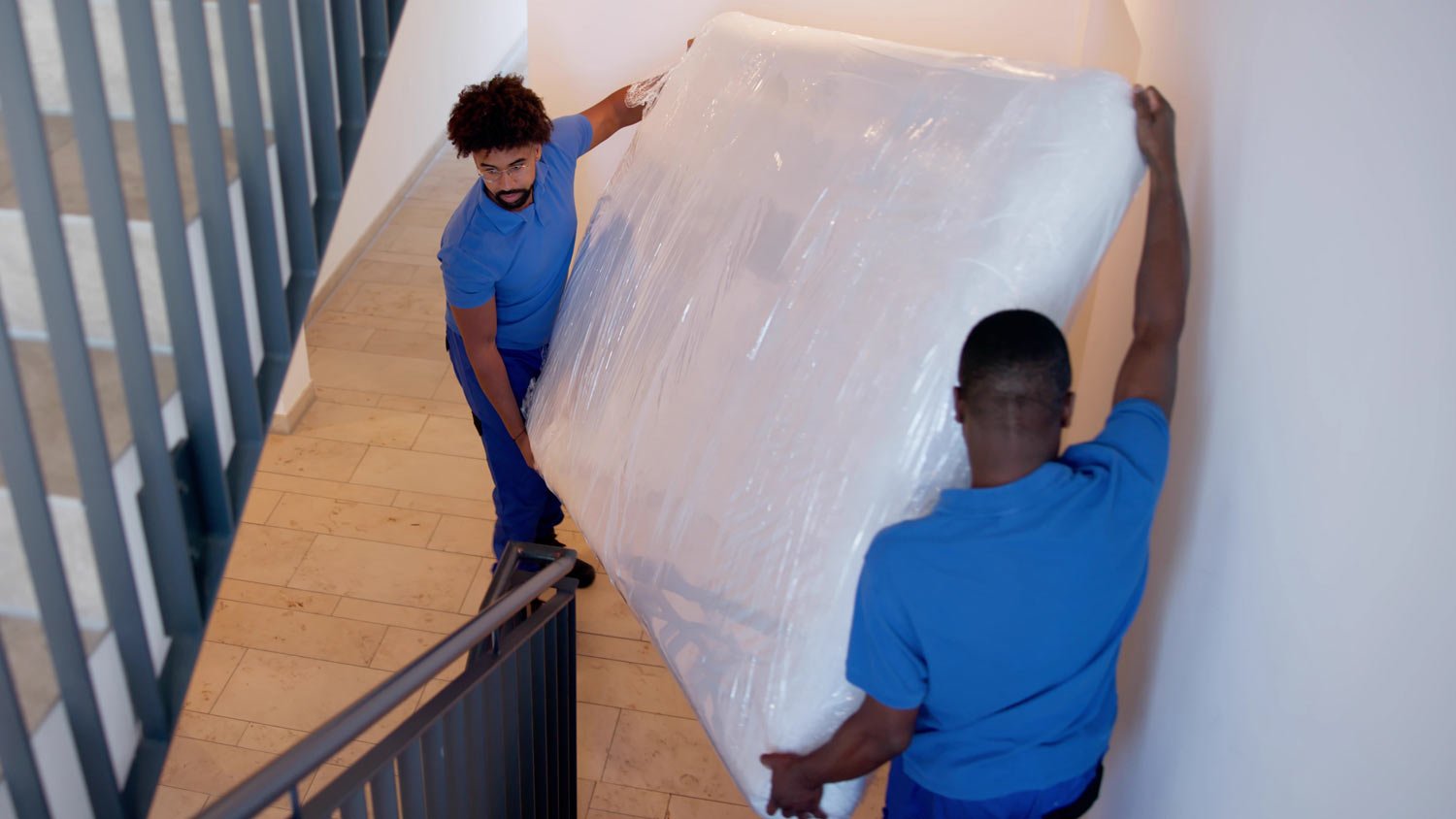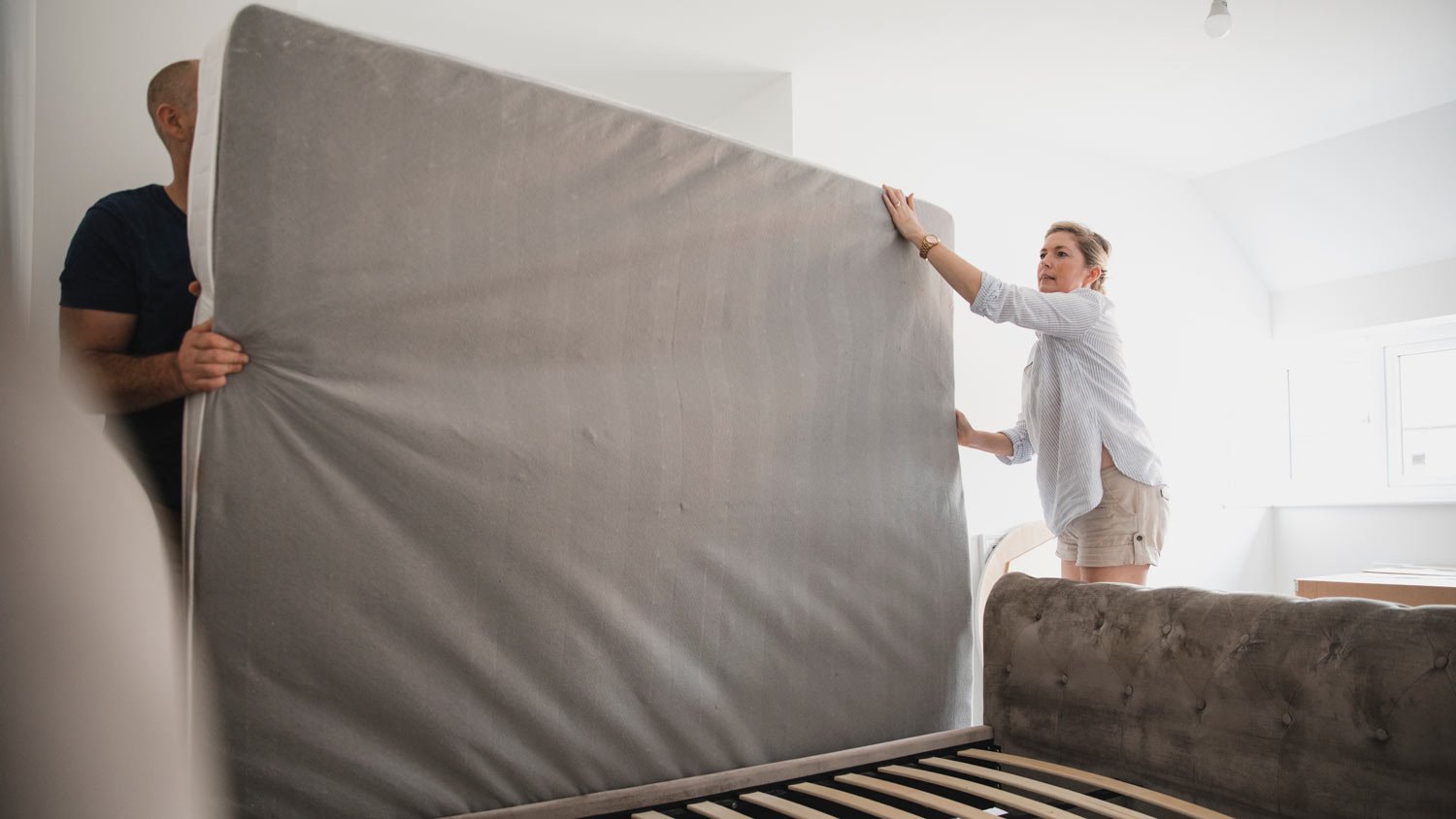
Get clear answers on oil tank removal costs, including average prices, key factors, and ways to save. Learn what impacts your project and how to budget.
Garbage collection costs depend on your project and location. Check with a local pro for your specific job.
Mattress removal costs $100 on average, but prices can range from $75 to $150 or more.
You’ll spend around $40 to $55 to remove a twin mattress and $80 to $130 to remove a king.
Memory foam mattresses cost more to remove than spring or coil mattresses, with memory foam costing around $120 and spring or coil costing around $90.
Reduce the cost of mattress removal by donating, recycling, or seeing if your local sanitation department is able to pick it up.
Mattress removal costs $100, on average, but prices can range from $40 up to $200 or more, depending on the size of the mattress, how you dispose of it, its condition, and some other factors. Mattresses are considered hazardous waste, so while it can get expensive to get rid of one, it’s important to follow local guidelines for proper mattress disposal to avoid even costlier fees.
In this guide, we’ll explain the cost of mattress removal and some factors that can influence the cost to help you budget more appropriately.

Mattress removal costs between $75 and $150 in most cases, and while the range is small, there are a few factors that can bring your higher or lower.
The size of your mattress is one of the most important cost factors to consider. Larger mattresses incur higher dumping fees and may require multiple people to move them out of your home, driving up labor costs. Generally speaking, the larger your mattress is, the higher your mattress removal costs will be.
| Mattress Size | Removal Cost |
|---|---|
| Twin | $40–$55 |
| Twin XL | $40–$55 |
| Full/Double | $40–$70 |
| Queen | $60–$100 |
| King | $80–$125 |
| California King | $100–$140 |
Your mattress material can also play a small role in your removal costs, mostly based on how the material affects the weight of the mattress. Heavier mattresses made out of high-density memory foam will often demand higher dumping fees. They also may require additional people to move and dispose of the mattress if you’re hiring a professional.
| Mattress Material | Removal Cost |
|---|---|
| Memory foam | $120 |
| Spring/coil | $90 |
You have a few options regarding the method for mattress disposal, and your choice will affect your mattress removal costs. In some municipalities, you can put your mattress out during regular bulk pickup days—or schedule a special pickup—and your sanitation workers will dispose of it at no cost. In some areas, you’ll just need to pay for approved mattress disposal bags.
If your sanitation department doesn’t take mattresses, you’re unable to move the mattress to the curb, or you need to remove it quickly, you’ll have to pay higher fees to hire junk removal professionals who remove mattresses.
The type of service you choose will affect your price. You can choose a standard junk removal service for quick removal, you can donate your mattress for free, or you can opt to dispose of your mattress yourself and just pay dumping fees.
| Disposal Method | Average Cost |
|---|---|
| Donation | $0 |
| Bulk pickup | $10–$20 |
| DIY disposal | $40–$80 |
| Retailer pickup | $40–$100 |
| Junk removal pro | $80–$200 |
| Dumpster | $200–$400 |
Remember that not all of these options are available in all areas. For example, some municipalities don’t allow you to place a mattress in a dumpster, and others won’t have their sanitation departments pick up old mattresses. Always follow local guidelines for proper disposal.
While there are federal guidelines for hazardous waste, each state and town also has its own unique guidelines. Make sure to check with your local government to understand its waste disposal regulations before starting your next removal project.
The condition of your mattress can sometimes play a role in your disposal fees, especially if it’s infested with fleas or bed bugs. Most junk removal companies will include an upcharge for hazardous debris removal in these cases—you could pay an additional $40 to $100.
Donation centers will also typically reject mattresses with fleas, bed bugs, heavy staining, odors, tears, broken springs, or heavy physical damage. If your mattress is unable to be donated, you’ll have to pay to have it removed another way.
If you’re hiring a professional to come into your home and haul your mattress away, it can be a nice gesture to tip the junk removal pros, especially if they have to maneuver the mattress up or down stairs or through tight doorways. You may want to consider budgeting an additional $10 to $20 per mover for tips in those cases.
If you opt to remove your mattress yourself, you’ll still have to pay dumping fees in most cases, but even then, you’ll save an average of between $20 and $60 since you’re not paying for labor. Those savings could go up to between $40 and $100 if you consider the money you’ll save on tips for your movers.
Removing a mattress isn’t difficult, but you should plan on having at least one other person help you. You’ll need to be careful lifting it to avoid injury, and you’ll want to make sure you have a truck or car large enough to transport the mattress safely.

If you’re unable to lift the mattress yourself, or you’d rather just pay for the convenience of having a professional do the work, you can call a local junk removal company to get an estimate.
Many homeowners couple their mattress removal with additional services to save on trip fees and labor costs. To that end, you might want to consider the following add-on services:
New mattress delivery: If you’re getting rid of a mattress, chances are you’re also buying a new mattress to replace it. Some retailers include delivery costs in the total if you aren’t picking your mattress up. Some include free delivery, while others charge up to $100 for delivery services.
Box spring or bed frame disposal: If you’re also getting rid of the box spring that sat under your old mattress, expect to pay an additional $20 to $40 to have that removed. Removing a bed frame alongside a mattress will often cost between $40 and $100, depending on the size and material.
Extermination services: If your old mattress was infested with fleas or bed bugs, it’s a good idea to pay for professional extermination services to ensure the rest of your home—and your new mattress—aren’t also infested. Bed bug extermination costs between $1,000 and $4,000 in most cases, while regular pest extermination costs between $100 and $300.
Additional junk removal: If you’re removing your old mattress along with other furniture or junk in your home, you can expect your total junk removal costs to sit between $150 and $350 in most cases. Prices can go up if you have a large amount to remove.
Mattress removal isn’t terribly expensive compared to some other home improvement projects, but many homeowners still look for ways to save in the process. You can do a few things to keep your costs down.
Consider donating. If you have donation centers in your area, you could dispose of your mattress at no cost if they accept mattresses and yours is in good condition. You can check with charitable organizations in your area for options. Just keep in mind that you’ll likely have to deliver the mattress yourself.
Recycle instead. You can also check with recycling centers in your area to see if they accept mattresses. This will also cost you nothing—except $10 to $20 in some cases to bag the mattress before delivery—but again, you’ll likely have to transport the mattress yourself.
Consider DIYing. If you don’t have access to donation or recycling centers that will accept your mattress, you can sometimes dispose of it yourself to save between $20 and $100 per mattress. You’ll have to transport your mattress yourself and check your local rules and regulations to ensure you can dump mattresses, but it’s a cost-effective option.
Rely on sanitation. You can contact your local sanitation department to see if they pick up mattresses during regularly scheduled bulk pickup or special pickup. In both cases, you won’t have to pay anything other than an occasional $10 to $20 fee for the proper mattress bags, depending on your municipality.
From average costs to expert advice, get all the answers you need to get your job done.

Get clear answers on oil tank removal costs, including average prices, key factors, and ways to save. Learn what impacts your project and how to budget.

Need to get rid of paint, solvents, or other chemicals? Use this guide on hazardous waste disposal costs to see what professional removal will cost.

If your home is brimming with things you don’t need, find out about your options when it comes to how to get rid of trash, from junk collection to recycling.

If you’re unsure of what to do with used motor oil after an oil change, learn how to dispose of used motor oil safely and responsibly.

Hazardous waste is defined by the EPA as any solid waste that poses a threat to human health or the environment.

If you’ve had the same gas tank for 30 years, it might be time to get rid of it. Here’s how to dispose of a propane tank in a safe way.